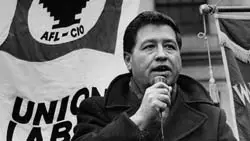Cesar Chavez
Cesar Chavez made a major contribution to the way in which farm labor and migrant workers were treated in the United States. His nonviolent methods of protest became a banner cry across the country for all workers that were forced to work for low wages and in poor conditions.


Cesar Chavez learned about the prejudice against the Hispanic community in America very early in life. His family home and land in Yuma, Arizona was stolen with an illegal deal from white businessmen. His family, now poverty stricken, relocated to California and lived in a ‘barrio’ (slum) and his father set the goal to try to send his children to college so that they could escape a poor life.

They all worked up and down the California coast as farm and migrant workers and Cesar attended thirty seven different schools that were taught by white teachers. Cesar grew up learning to live with horrible racial comments by both the teachers and students as well as some schools that separated the Hispanic children from the white children. He was forced to drop out of school in the eighth grade and work the fields full time when his father was involved in an accident.

After two years in the Navy, which was segregated for minorities, he married and returned to San Jose, California where he met Father Donald McDonnell. He became involved in discussions about farm worker rights and strikes. It was during this time that he also became involved in the philosophy of nonviolence through reading about Gandhi and St. Francis. Cesar started an organization called the Community Service Organization (CSO) that started a focus on voter registration for the workers.

By 1962, Cesar became the founder of the National Farm Workers Association that would later be the UFW, United Farm Workers. He designed a flag that was the symbol of the organization and he wanted it to be seen as a symbol of dignity. In 1970 the UFW had the grape growers to accept a labor union contract and this step allowed 50,000 paying members to become an organized group in the industry. His leadership, combined with nonviolent actions prompted a 340 mile march in protest and the Delano grape strike to require that the state allow farm workers to organize into a union which would bring ‘collective bargaining’ (bargaining with power in numbers) and for safe working conditions. The workers carried a flag with the symbol and the words ‘Viva La Causa’ (Long live our cause).


Cesar encouraged nonviolent methods of protest including strikes, pickets and boycotts to achieve their goals. He trained many of the workers so that they could go to other areas where there were protests and make sure the nonviolent methods were used. Cesar himself participated in many food protests where he fasted for days for the cause. The reason he did this was to make sure that the angry protestors saw the results of nonviolence as an action.

Farmers across the country were taking notice of Cesar and his group. The workers were being put in danger every day due to mass use of pesticides, long working days, unsafe conditions, low pay and prejudice. People from all walks of life began to hear about Cesar’s fasting protests and joined in support by refusing to buy grapes. His actions were the final protest as the grocery stores were continuing to buy the grapes that were earned on the backs of the migrant and farm workers.

Cesar’s efforts became so well-known across the United States that he was joined by many members of the religious and celebrity community. His 36-day Fast for Life in August 21, 1988 was completed and was followed by The Reverend Jesse Jackson picking up for Cesar by fasting for three days and then passing the fast on to the other members that had joined their group: Actor, Martin Sheen; SCLC President, the Reverend J. Lowery; Actors Edward Olmos and Emilio Estevez; Kerry Kennedy, daughter of Robert Kennedy; Legislator, Peter Chacon; Actress, Julie Carmen; Actor, Danny Glover; Singer, Carly Simon and Actress Whoopi Goldberg.




